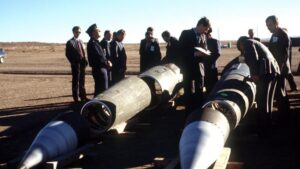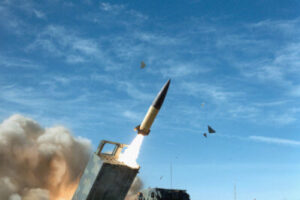
About the HCoC
Adopted in 2002, the Hague Code of Conduct against Ballistic Missile Proliferation (HCoC) is a politically binding instrument aiming to limit the proliferation of weapons of mass destruction (WMD) delivery vehicles. Composed of a set of transparency and confidence-building measures, the HCoC is the only existing multilateral instrument to focus on WMD delivery vehicles. The HCoC has reached 143 subscribing states (December 2022) vs 93 at its inception.
When subscribing to the HCoC, states commit to abide by a set of UN treaties and international conventions on space security; to produce an annual declaration regarding ballistic missile capacities and national policy on non-proliferation and disarmament treaties and instruments; and to deliver pre-launch notifications prior to any missile or space launch. Documents are uploaded onto a dedicated online platform managed by Austria, which acts as the HCoC Immediate Central Contact (Executive Secretariat). Subscription to the HCoC is free of charge.
While subscribing states are asked to exercise ‘maximum restraint’ in the development of ballistic capacities, they are proscribed neither from possessing ballistic missiles nor from pursuing space launch activities. In return, subscribing to the HCoC enables states to gain access to information shared by other subscribing states, and to display their political commitment to non-proliferation and disarmament.
In brief
Caribbean states have regularly joined the HCoC since its adoption in 2002, showing a steady interest in the Code. But despite this, the current level of subscription remains low, with half of the 16 Caribbean states having signed it.
The low subscription rate is partly explained by concerns about possible administrative costs and a low priority granted to missile proliferation issues. However, the Caribbean – as an important transit and financial hub, that has difficulties curbing illegal trafficking of arms and assets, and given the importance of a secure access to space data – would benefit from an enhanced focus on the HCoC.
The limited commitments of the Code can be attractive for states with limited resources but a political will to show their support to global non-proliferation efforts.
Authors: Lauriane Héau and Emmanuelle Maitre
Regional interest in the HCoC
The threat posed by ballistic systems in the Caribbean1 today is very low, as no regional actor possesses a missile arsenal. These circumstances may explain the limited level of subscription to the HCoC (8 out of 16 states as of December 2022). But while a number of states have yet to formally subscribe to the Code, overall support by the region for this instrument can be observed.
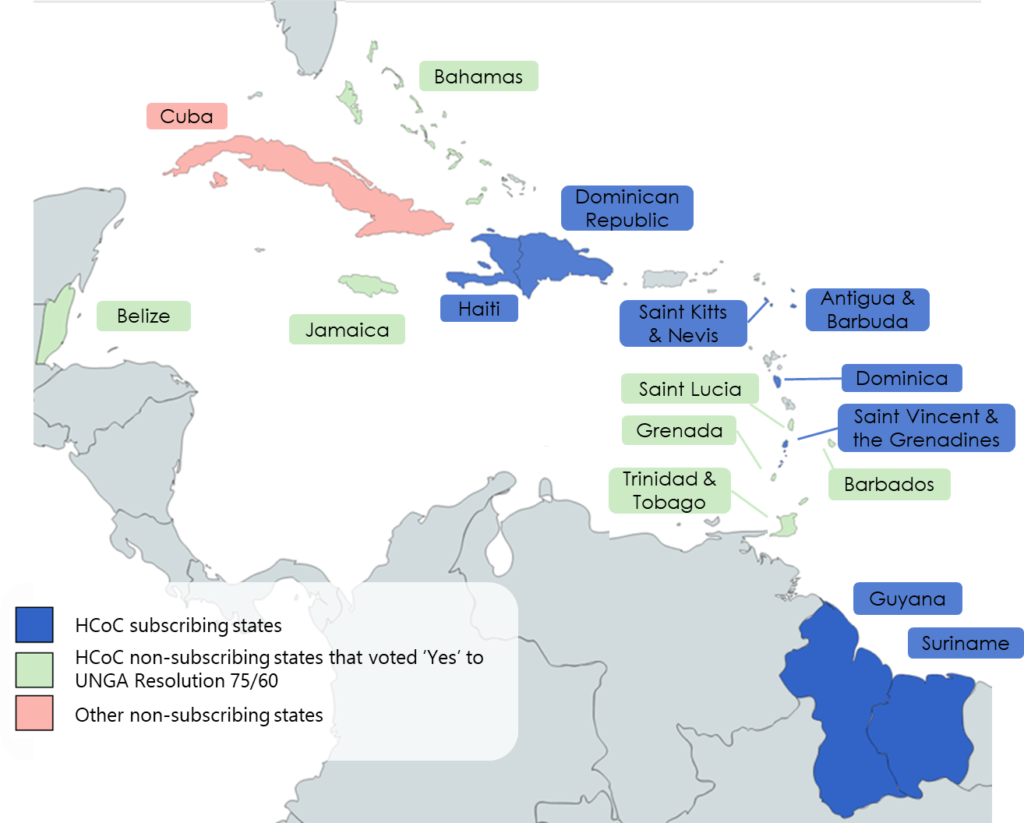

Firstly, it should be noted that the rate of HCoC subscription by Caribbean states has steadily increa-sed since its inception, with Saint Vincent and the Grenadines joining in 2020 and Saint Kitts and Nevis in 2014.
Secondly, Caribbean states have consistently supported the United Nations General Assembly (UNGA) resolutions in support of the HCoC. Thus, seven non-subscribing states have voted in favour of all ten resolutions adopted since 2004. Cuba remains the only state to consistently abstain and to voice its scepticism vis-à-vis the Code.
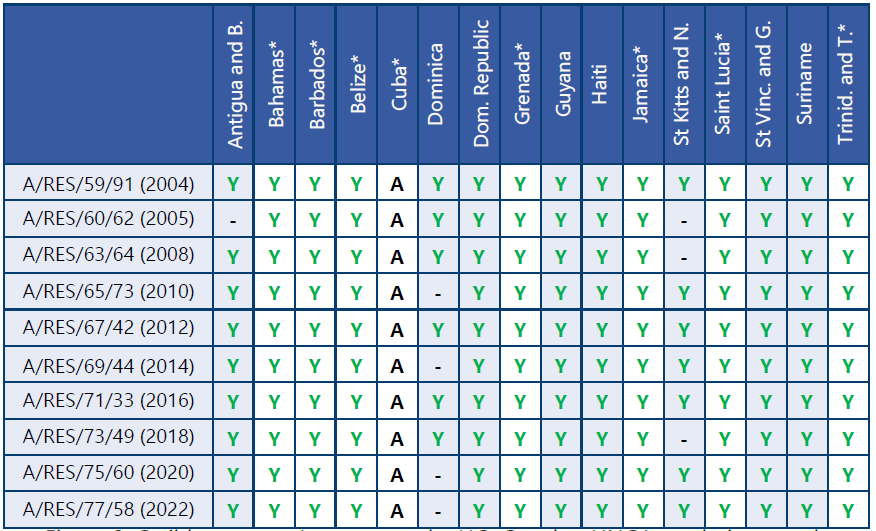
Regional attention paid to disarmament and the non-proliferation of WMD
While the question of WMD proliferation may appear remote to countries that have no capabilities and are not directly threatened by these systems, Caribbean states are relatively well involved in the implementation of disarmament and non-proliferation norms. The priority for the region has historically been the fight against nuclear weapons, having witnessed the risk of nuclear war since the Cuban missile crisis in 1962, in the midst of the Cold War. The rejection of nuclear weapons was set in stone with the adoption of the Treaty of Tlatelolco in 1967; as well as a general rejection of nuclear deterrence as a way to address conflicts in the international system. This position is demonstrated by the support provided by many Caribbean states to the recently adopted Treaty on the prohibition of nuclear weapons (TPNW).
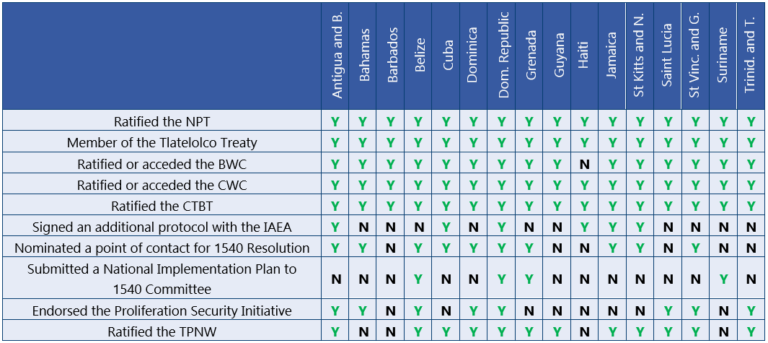
Caribbean states also largely participate in international efforts to stem proliferation, with a quasi-universal participation to the chemical (CWC) and biological (BWC) weapons conventions as well as the Comprehensive Nuclear Test Ban Treaty (CTBT). Eight Caribbean states support the Proliferation Security Initiative and all states have submitted at least an initial report to the 1540 Committee. Efforts could be pursued by nominating points of contact systematically as part of the implementation of Resolution 1540 or by drafting national action plans. CARICOM is especially active in assisting states in implementing their non-proliferation obligations.2 Taking up these international commitments has been done while recognising the specific proliferation challenges the region is facing (see box). Most states of the region therefore perceive non-proliferation agreements as matching their national interests and their ambitious disarmament policies. But they are also aware of the potential problems they may face on the ground in implementing their commitments. Thus, subscription to the HCoC is appreciated according to the specific WMD proliferation challenges in the region.
Specific WMD proliferation challenges in the Caribbean
- An important transit and trans-shipment hub (especially the Panama Canal) for strategic goods
- Large maritime and air spaces with under-manned, vast borders
- Proliferation concerns often linked to law enforcement and customs issues, especially in the fight against illegal firearms (and drugs) trafficking
- A number of countries facing challenges to counter money laundering, terrorist financing, and proliferation financing
- Small size of national administrations to address to these issues and implement international obligations
Challenges and opportunities of subscribing to the Code for Caribbean states
Several challenges help to explain the limited rate of subscription to the HCoC by Caribbean states. However, for states which are supportive of the instrument, these reservations can be offset by the tangible benefits of the Code. One concern commonly shared by countries with small bureaucracies and limited resources is that taking up new commitments might lead to an administrative burden that they can scarcely afford. Implementing the Code requires almost no resources and time since states with no missile or space launch capabilities must only fill in and send a ‘nil form’ each year.
A second obstacle to HCoC subscription and implementation in the region is the feeling that it does not meet the priorities of Caribbean states, which do not possess missiles, have no civilian launching programmes or project to develop any, trade very few components linked to missiles and launchers and are more focused on the proliferation of small arms and the trafficking of drugs than on WMD. This perception is however contradicted by the entanglement between WMD and small arms non-proliferation tools and capacities. Moreover, the HCoC does provide indirect – but tangible – benefits for those states. By contributing to reducing the ambiguity between civilian and military technologies in space, it increases transparency, thereby strengthening space security. This is beneficial to Caribbean states which, while not launching satellites themselves, depend increasingly on securing space assets and data, for instance for natural hazard prevention, disaster management or maritime security. Moreover, reinforcing non-proliferation regulations provides net benefits for international (maritime) trade, including in key sectors for the region such as banking and logistics, but also in dual-use items manufacturing.3
Finally, for some states a non-binding instrument like the HCoC may not be a priority in the struggle against WMD proliferation. This perception may be accentuated by the current crisis in arms control, which puts into question the efficacy of a step-by-step approach to disarmament, and the support by a majority of regional states for the TPNW. Moreover, some may feel that efforts to reduce the risks linked to WMD should be first and foremost endorsed by states that develop these weapons. The HCoC can speak to these concerns. On the one hand, the countries operating ballistic missiles and space launch vehicles are the ones tasked with providing key information to other subscribing states. The major constraints of the HCoC in terms of non-proliferation and transparency therefore lay on those operating the systems, while the others benefit from their participation. On the other hand, confidence-building measures (CBM) such as the HCoC are useful to avoid tensions accidentally transforming into major confrontation. As such, the HCoC can complement an ambitious disarmament agenda and adapted to the timeframe necessary to ensure the full elimination of WMD.
1 In this paper, the Caribbean is defined as all island-states of the Caribbean sea (Antigua and Barbuda, Bahamas, Barbados, Cuba, Dominica, Dominican Republic, Grenada, Haiti, Jamaica, Saint Kitts and Nevis, Saint Lucia, Saint Vincent and the Grenadines, Trinidad and Tobago) as well as the three continental CARICOM members (Belize, Guyana, Suriname).
2 For details regarding CARICOM’s work on UNSCR 1540: <http://caricom.org/united-nations-security-council-unsc-resolution-1540/>.
3 For more information, see The Stimson Center’s project on Security and Trade Efficiency Platform (STEP): <https://www.stimson.org/wp-content/uploads/2020/11/Stimson-STEP-Brochure.pdf>.

